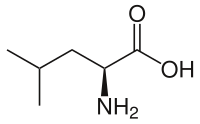
Photo from wikipedia
The liver is the most essential organ for the metabolism of ammonia, in where most of ammonia is removed by urea and glutamine synthesis. Regulated by leucine, glutamate dehydrogenase (GDH)… Click to show full abstract
The liver is the most essential organ for the metabolism of ammonia, in where most of ammonia is removed by urea and glutamine synthesis. Regulated by leucine, glutamate dehydrogenase (GDH) catalyzes the reversible inter-conversion of glutamate to ammonia. To determine the mechanism of leucine regulating GDH, pigs weighing 20 ± 1 kg were infused for 80 min with ammonium chloride or alanine in the presence or absence of leucine. Primary pig hepatocytes were incubated with or without leucine. In the in vivo experiments with either ammonium or alanine as the nitrogen source, addition of leucine significantly inhibited ureagenesis and promoted the production of glutamate and glutamine in the perfused pig liver (P < 0.05). Similarly, leucine stimulated GDH activity and inhibited sirtuin4 (SIRT4) gene expression (P < 0.01). Leucine could also activate mammalian target of rapamycin complex 1 (mTORC1) signaling (P < 0.05), as evidenced by the increased phosphorylation levels of ribosomal protein S6 kinase 1 (S6K1) and ribosomal protein S6 (S6). Interestingly, the leucine-induced mTORC1 pathway activation suitably correlated with increased GDH activity and decreased expression of SIRT4. Similar results were observed in primary cultured hepatocytes. Notably, leucine exerted no significant change in GDH activity in SIRT4-deficient hepatocytes (P > 0.05), while mTORC1 signaling was activated. Leucine exerted no significant changes in both GDH activity and SIRT4 gene expression in rapamycin treated hepatocytes (P > 0.05). In conclusion, L-leucine increases GDH activity and stimulates glutamate synthesis from different nitrogen sources by regulating mTORC1/SIRT4 pathway in the liver of pigs.
Journal Title: Animal Nutrition
Year Published: 2018
Link to full text (if available)
Share on Social Media: Sign Up to like & get
recommendations!